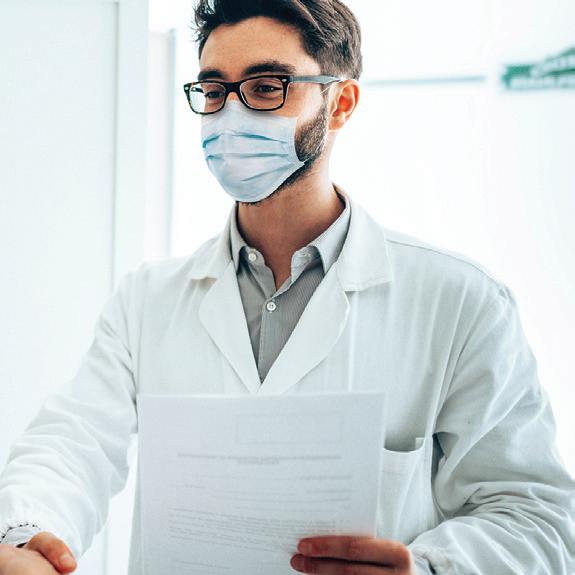
4 minute read
The guidelines for various cancer screenings
doctors to advise patients on their overall health and how to improve it if exams and blood work turn up any red flags. Visiting a doctor during the pandemic. As vital as preventive care can be, it’s understandable if people are hesitant to visit their doctors during the pandemic. But patients can take certain steps to calm their nerves about booking preventive care appointments during the pandemic.
Schedule telemedicine appointments. The number of telemedicine appointments has skyrocketed during the pandemic. While the transition from predominantly in-person appointments to telemedicine might have been a reluctant and rocky one at the start of the pandemic, many doctors’ offices have since firmly established their telemedicine protocols. The Mayo Clinic advises patients who have not yet tried telemedicine to contact their doctors’ offices to arrange an appointment.
Inquire about office procedures. Doctors try to keep patients healthy, not get them sick. Various medical organizations, including the American Academy of Family Physicians, have provided thorough checklists to help physicians prepare their offices to welcome patients during the pandemic. Patients can ease their concerns by contacting their doctors’ offices and asking them about their pandemic-related protocols.
Don’t hesitate to make requests. There’s no such thing as being too safe from COVID19, so patients can work with their doctors to calm their fears even further. Ask to pay copays over the phone and request that the front desk call you when the doctor is ready so you don’t have to sit in the waiting room. Preventive care is an important component of health care, even during a pandemic.




“Build a Solid Foundation to a Healthier You on the Rock” » 24 24/7 /7 Ac A cess » 24/7 Security » HDTVs » Private Showers » Tanning

Book your spot in group training today! 107 1st Ave., Rock Falls, IL » (815) 564-9000 724fitnessontherock.com
The guidelines for various cancer screenings
Screenings are vital components of preventive health care. Much like healthy diets and routine exercise can reduce a person’s risk for various diseases, early screenings can reduce the likelihood that diseases like cancer will prove fatal. The COVID-19 pandemic has affected nearly every aspect of life, including preventive care. Data from the medical records vendor Epic revealed that, between March 2020, when COVID-19 was first declared a pandemic, and early fall 2020 screenings for cancers of the breast, cervix and colon had declined by 86 to 94 percent. Patients’ hesitation to schedule screenings during the pandemic is understandable. However, medical professionals continue to urge men and women, particularly those who are vulnerable to certain cancers, to schedule screenings. Doctors’ offices and hospitals have adjusted their protocols during the pandemic in an effort to keep patients safe, so adults should not hesitate to schedule screenings. The following guidelines can help patients determine if the time is right for them to be screened for various cancers. Breast: Hackensack Meridian Health notes that mammograms have reduced breast cancer mortality in the United States by 40 percent since 1990. The National Comprehensive Cancer Network, Society of Breast Imaging, American Society of Breast Surgeons, and American College of Radiology recommend that women begin receiving annual mammograms at age 40. Lung: Low-dose computed tomography, often referred to as low-dose CT scans, are noninvasive, simple tests that have helped increase lung cancer survival rates considerably. Hackensack Meridian Health notes that only 15 percent of lung cancers are diagnosed early, so it’s imperative that vulnerable adults prioritize screening (nonsmokers and people who have never smoked are typically not referred for screening). Annual screening is recommended for current smokers or anyone who has smoked in the past 15 years, though doctors may recommend less frequent testing depending on the results of past screenings. Cervical: Cervical cancer screenings, whether it’s a Pap test or an HPV test, can be conducted during women’s health screenings. Death rates for cervical cancer have dropped considerably thanks to increased screening, so it’s important that women discuss their risk with their physicians. The American College of Obstetricians and Gynecologists recommends average-risk women between the ages of 21 and 29 have a Pap test every three years, while those between the ages of 30 and 65 have a Pap test and an HPV test every five years. Skin: Skin cancer screenings typically involve doctors examining patients’ skin from head to toe. If the doctor notices any abnormalities, a biopsy may be taken. People at increased risk of skin cancer, which includes those with fair complexions, a significant history of sun exposure and sunburns and a family history of skin cancer and melanoma should receive full-body screening exams every year. People also can conduct selfexaminations and report any abnormalities they find to their physicians immediately. Cancer screenings are vital components of preventive health care and should remain so even during the pandemic.








